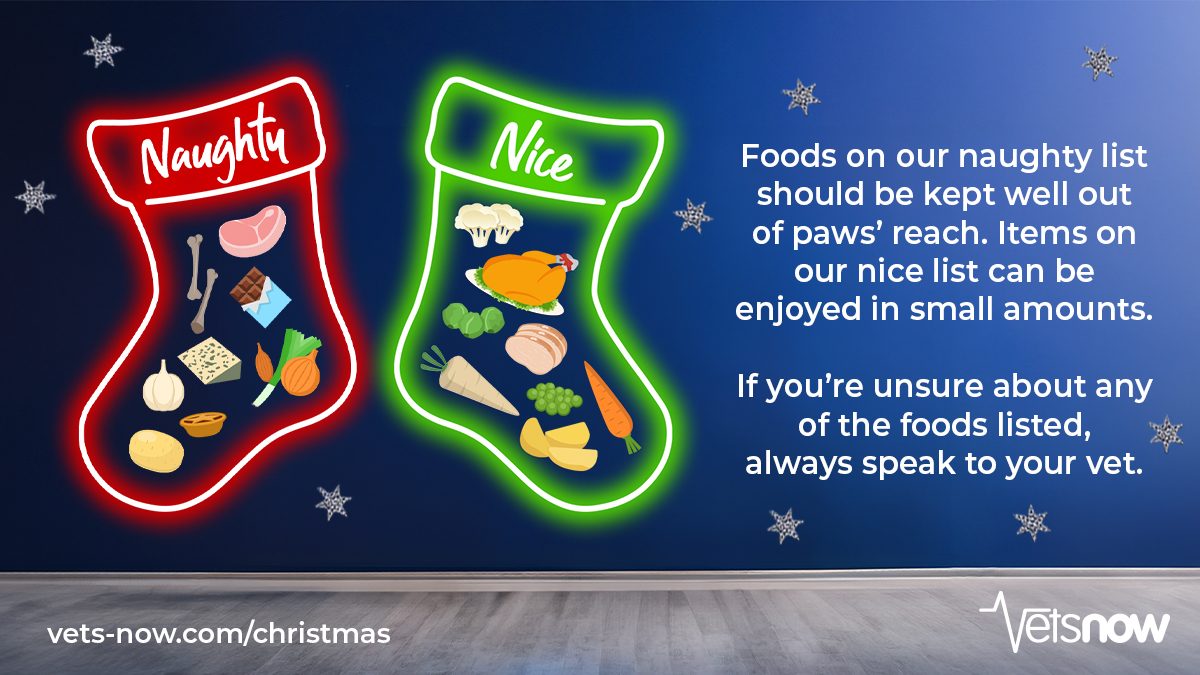
Christmas is fast approaching, and you may be wondering whether you’ll wind up on Santa’s naughty or nice list. But how does your dog’s festive feast fare?
The season is all about tucking into plentiful plates of turkey, delicious roasted potatoes, lashings of gravy and indulgent puds, but when it comes to our pets, there’s some seasonal foods that are strictly on the naughty list!
If you always save a space for your dog at Christmas dinner, you’re not alone. We asked our social media followers if Christmas dinner was on the menu for their pet this year and 30% said yes.
Owners just need to be a little mindful of what they put in their pet’s bowl, especially as some foods can lead to digestive discomfort or more severe health risks.
With our handy food guide, it’s easy to see what foods are going to be naughty or nice for your pooch. And if owners follow these simple tips , Christmas can still be a time for everyone to eat and be merry. Talk about a happy howl-day!
Sadie Spencer, Principal Vet at Vets Now Liverpool, says:
“Christmas is a time for joy and celebration, but while you’re indulging in turkey and mince pies, remember not all holiday treats are fit for furry friends! Dogs might look at your Christmas pudding or chocolate with longing, but these can cause serious health issues. Trust me, your dog can ‘sample the festive spirit’ in a safe way and have a happy, healthy start to the New Year too!”

On the nice list
These foods are safe for your pooch in moderation. Just because you can handle seconds and thirds, doesn’t mean your dog’s stomach can! Offer them the same amount of food as always and try to avoid introducing anything new if your dog has any special dietary needs that may make some of the foods listed unsuitable for them.
Turkey
Turkey can be a high protein treat for dogs, a small slice of skinless turkey crown, cooked through and not seasoned with things like garlic and onion, which can irritate the gut is fine.
Chicken
Like with turkey, be sure it’s skinless, cooked through and unseasoned. Make sure to avoid bones, as these could splinter in the stomach or become lodged in the throat.
Carrot
Both raw and cooked carrots are a healthy option for your dog. Make sure raw carrots are cut into bite-sized chunks to avoid choking.
Peas
Peas are packed with minerals and nutrients, and it’s safe for your dog to eat them on occasion. You can offer them fresh or frozen, but it’s best to avoid canned as they may be high in salt.
Parsnips
Parsnips are a great source of vitamins, minerals and fibre, as well as folate, potassium and manganese. Offer them in moderation and mix them in with their usual food. Also be sure the skins are washed thoroughly.
Sprouts
These can be a healthy snack for your dog. Serve them cooked as raw sprouts can be difficult to digest, especially if your dog has a sensitive gut.
Cauliflower
While the cheese sauce of cauliflower cheese may be too rich for your dog’s tummy, plain cooked cauliflower is a great option. It’s non-toxic and high in fibre.
Potatoes
If they are cooked, potatoes are fine for your dog to enjoy in moderation. Roasted potatoes can be a safe option for your dog, provided they are not cooked with excessive seasonings or fat.
On the naughty list
If these foods had a stocking, they’d be getting a lump of coal! Make sure you avoid your pet consuming these, as they can lead to unpleasant consequences.
Christmas puddings and mince pies
These festive treats usually contain raisins, which alongside sultanas and currants, can all cause acute kidney failure and, in some cases, prove fatal. Even a small bite could prove dangerous, so always keep out of reach.
Blue cheese
Blue cheese uses a fungus that produces a substance called roquefortine C. Dogs can be extremely sensitive to this, and it can cause vomiting, diarrhoea, high temperatures and even seizures.
Chicken on the bone
Chicken can be an excellent source of protein for your pet, but be sure it’s cooked thoroughly to avoid food poisoning. Chicken bones are dangerous, whether cooked or not, as they can get lodged in a dog’s throat, or splinter and cause a puncture.
Chocolate
Chocolate contains caffeine and theobromine, which are toxic for dogs. They not only cause stimulation of the central nervous system and heart, but can act like a diuretic and lead to dehydration. The darker the chocolate the more poisonous it is. If you’re worried about how much chocolate your dog has consumed, use our chocolate calculator.
Raw potatoes
Raw potatoes contain solanine, which is a compound that can be toxic to dogs. Cooking potatoes reduces the amount of solanine but many seasonings, such as garlic and onion powder, can be toxic too.
Garlic
Whether raw or cooked, garlic is toxic for dogs due to a compound called thiosulfate. If your pet consumes enough, it could even prove fatal without medical intervention.
Onions, leeks and shallots
Onions, leeks and shallots are in the same food family as garlic and all of these can cause stomach and gut irritation. They can also lead to red blood cell damage and anaemia.
Pork
Pork can be very fatty, which makes it dangerous for dogs as high in fat foods can lead to life threatening pancreatitis. Raw or undercooked pork meat may contain trichinella parasites, which can be harmful for both dogs and humans.
The warning signs of food poisoning in dogs
- Excessive thirst
- Vomiting
- Diarrhoea
- Restlessness
- Hypersalivation
- Incoordination
What should you do if you fear your dog has eaten something toxic?
Try to stay calm and remove the source of poison from your dog’s reach. Call your daytime vet or if it’s out of hours, contact your nearest Vets Now service and follow their expert advice. Act fast if you fear your dog has swallowed something toxic, as getting them to a vet as quickly as possible will give them the best chance, take any packaging with you.
What are the signs your dog is choking?
Common signs that your dog is choking include appearing in extreme distress, displaying an excess amount of drool, pawing at their mouth, and making choking sounds. They may rub their face on the ground and appear to gag and retch. You may also see them coughing and some blue-coloured skin if they are struggling to breathe.
What should you do if your dog is choking?
Act fast and contact your vet or your nearest Vets Now service. You can try first aid, such as the Heimlich manoeuvre, but it mustn’t delay your journey to the vets and should only be administered for a minute or two.
Find lots more about keeping your dog safe at Christmas on our Christmas hub.
